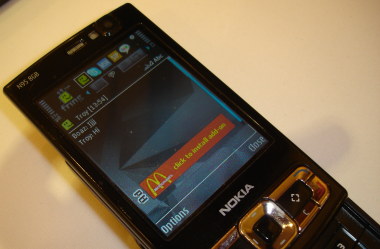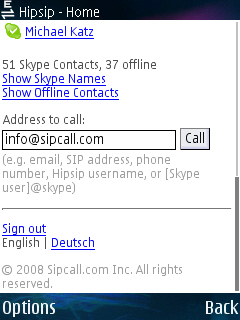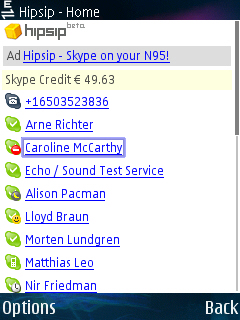Sipgate is one of the best quality VoIP providers I know for Germany, Austria and the UK. They give free inbound numbers and, with rare exceptions, they always work. Last friday they were
down for a half hour, but this was no big problem.
Until people started to realize that Sipgate behaves strangely since then. As I tested Sipgate is blocking all the free "always connected" web based PBXes I know:
Voxalot, PBXes.com and
simplyConnect. That's really annoying since those websites do a great job. You can deposit there all your login data for the many SIP accounts you got from different companies. Then you need only one account, for example Voxalot's, to receive phone calls to all your different VoIP numbers on one device. Also you can define dial plans for
least cost routing. Then Voxalot uses for instance provider A for phone calls to country number 1 and provider B for country number 2, always taking advantage of the cheapest connection.
Thats nice for VoIP devices which can hold only one SIP account, such as certain mobile phones or the
Fring software, which recently got very important for mobile VoIP users in Great Britain. With Fring you can avoid the problem that for Orange UK and Vodaphone UK are
blocking VoIP on the brand new Nokia N95 mobile phone. As an external Symbian program Frings makes SIP calls possible on these crippled N95, but holds only one SIP account. Which should be Voxalot or something similar if you have different providers. I already
use more than 20 VoIP providers.
It seems that Sipgate doesn't like the described least cost routing, since their prices aren't cheap compared with other providers. Poor Sipgate! Mean Germans use them only to receive calls on Sipgate's free incoming numbers, but for outgoing calls they use free VoIP services from companies like
Betamax. Nothing is cheaper than free, and even Sipgate's flatrate for Europe cannot compete with it. Maybe Sipgate did not like it that the their Voice Mail answered all calls to my dozens of different VoIP accounts that I have installed at Voxalot. Even if you called my
FWD or
Gizmo account the Sipgate Voice Mail kicked in. This was a nice feature since I had to deal with only one Voice Mail box for all my VoIP and fixed line calls.
It seems that Sipgate wants to work like a normal PSTN telco and tries to be as much separated from the SIP world as possible. Only if people use Sipgate for their outgoing phone calls and do not free ride their services they can sponsor the free incoming numbers. I, for instance, use Sipgate's number and Voice Mail yet for years but never paid them any money, since all my outgoing calls go for nearly free over the
Betamax company
Voipstunt. People from England do the same, as you can read in Voxalot's
forum.
I suppose that Sipgate prefers to be their clients only VoIP provider and therefore it blocks more and more interoperability options. This started already months ago when they began to block phone calls from other VoIP providers to their SIP adresses. SIP to SIP is normally free. But now the only option is to call the phone number of a Sipgate user, which is only free within the Sipgate network or for calls from their spare peering partners.
The hottest discussion about the PBX blocking I found in
Voxalot's forum. Sipgate clients are disgruntled that they cannot use the service with Voxalot anymore and give tips about alternative providers. One user even threatened the Sipgate support to cancel his account and got surprised that they did not try to hold him back, but explained in a polite way
how to do it.
Originally Posted by sipgate
You can delete your account under "Settings" -> "Contract".
Best regards,
Frederik van Koningshoven
Sipgate's official explication is the
following:
login details must not be given to 3rd parties. the provider mentioned above (note: voxalot is ment) attracted attention due to nonserious business practices. for our customers safety we try to remedy potential abuse through this corporation.
Other Voxalot clients got a
clearer answer from the Sipgate support:
Originally Posted by sipgate
we block Voxalot and similar services, because our customer has to give them the login details.
This is a security problem.
Best regards,
Frederik van Koningshoven
Later it got more personally
against Voxalot:
Originally Posted by sipgate
Unfortunately, we don't consider them as trustworthy.
This decision will not be changed in near future.
Best regards,
Frederik van Koningshoven
Poor Voxalot! What did they do? How should the company behave in this situation?
Voxalot's support worker Martin
says that he "would be interested to know if this is an across the board "security rule" or if simply Voxalot was "singled out".....". An interesting question, because
Fring seems to work very well with Sipgate, although Fring also requires the user to give his Sipgate login details to a 3rd party.
Why isn't Sipgate blocking Fring as well?
In fact this is a general problem: With every time more services moving into the web people have to provide every time more secret login data to 3rd parties. It reminds me of a former post that I wrote in april in Voxalot's forum,
"Theoretically Voxalot could steal all our VoIP minutes".
But it's not only
Voxalot. It's also
PBXes.com,
simplyConnect,
Fring,
Barablu,
Nimbuzz,
Talkster,
Mobivox,
Iskoot,
Skip2PBX,... Dozens of companies are in the same situation. There has to be a more intelligent solution than just blocking Voxalot. What's missing is a secure way to share login data.
Maybe
OpenID is the answer?
CORRECTION: Sipgate now at least seems to work OK with PBXes.


